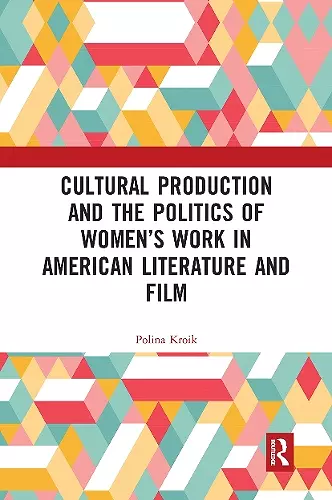Cultural Production and the Politics of Women’s Work in American Literature and Film
Format:Paperback
Publisher:Taylor & Francis Ltd
Published:18th Dec '20
Currently unavailable, and unfortunately no date known when it will be back
This paperback is available in another edition too:
- Hardback£145.00(9781138327269)

Cultural Production and the Politics of Women’s Work in American Literature and Film emphasizes the interrelation among women’s workplace roles, modes of authorship, and processes of subject-formation, pointing to some of the reasons for the persistence of limiting gender roles and occupational hierarchies that arose during the first 60 years of the 20th century.
The book interrogates three common narratives: The rise of Fordism as a "masculine" mode of production and the transition to an era of "feminized" work; women’s liberation through the sexual revolutions; and the rise of a new form of literary authorship. Conversely, it suggests that women’s labor was integral to the operations of the Fordist business sphere, where, unlike at the factory, the white-collar office proletarian work was casualized and feminized. This book argues that this workplace was an important site of subject formation, affirming dominant ideologies through economic practices.
Analyzing work by Sinclair Lewis, Nella Larsen, Anita Loos, and Sylvia Plath, the book presents an alternative history of American modernism, one that is more attuned to gendered discourses of labor and class. By looking at the micropolitics of power within cultural institutions, this study moves beyond the dichotomies of exclusion/inclusion to interrogate the terms on which women and minorities worked as producers, and the ideas and experiences that consequently entered the field of intelligibility.
Polina Kroik's smart, nuanced analysis of women's clerical work in fiction and film expands our views of Fordism, modernism, and indeed the modern workplace. She takes a fresh look at both canonical and lesser-known works by Sinclair Lewis, Edith Wharton, Nella Larsen, Anita Loos, and Sylvia Plath, revealing the relationship between the gendered nature of office work and the gendered nature of cultural production in the first six decades of the 20th century. Significantly, she extends this analysis to the contemporary workplace, arguing persuasively that the gender inequity and gender expectations reflected in modernist works and in pre-1970s workplaces continues into the 21st century, even as women have moved into new roles and technology has transformed the very spaces in which we work. Her emphasis on affective labor and the ways in which it is rendered invisible and undervalued is as relevant to the early 20th century workplace as it is to today's gig economy.
Kathlene McDonald, CUNY Center for Worker Education
"Polina Kroik has achieved a rare feat in this exciting new book by constructing a fresh account of American Modernism that grapples with the gendering of class and work. Kroik’s argument combines a broad historical reach with incisive analyzes of a rich array of cultural texts, exposing how gender and race mediate the intelligibility of cultural production and producers."
Alyson Cole, Queens College and the Graduate Center, CUNY
ISBN: 9780367731908
Dimensions: unknown
Weight: 453g
198 pages